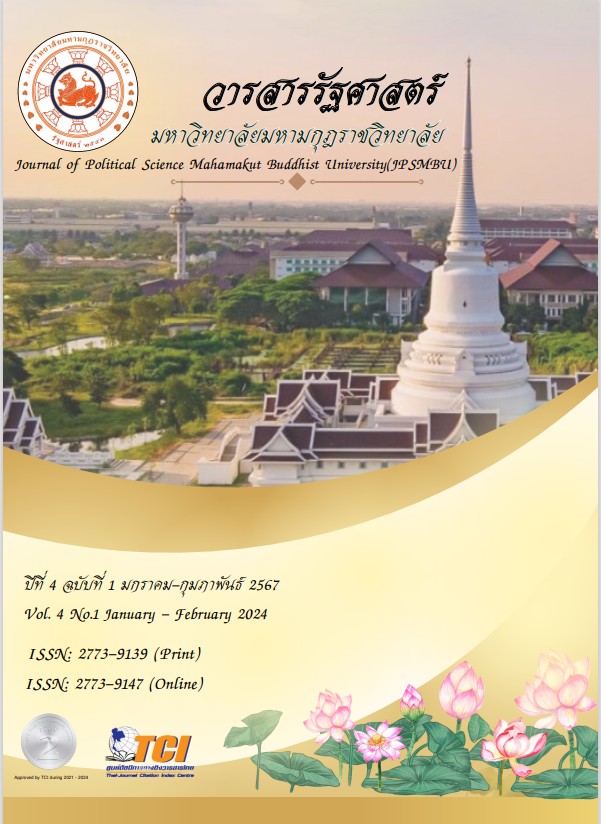CREATIVE ECONOMY SOFT POWER : STIMULATING THE THAI ECONOMY IN THE FUTURE
Main Article Content
Abstract
Creative Economy is the development of competitiveness of sustainable products and services. By using cultural assets (Cultural Assets-based), creativity (creativity), innovation and technology (innovation and technology) to create economic value. To be an important foundation before becoming a destination like Soft Power that becomes an important tool that will help increase economic value.
propulsion Soft Power into communities is a process of participation from citizens and cooperation from many sectors of society. But in the past, Thailand's soft power drive has lacked clarity. discontinuity Government personnel lack understanding of the essence of the Creative Economy and Soft Power, causing them to be unable to convert local resources into Soft Power. Guidelines for developing the Creative Economy to deliver Soft Power to local communities, the government should Looking at various dimensions as follows. 1) Encourage entrepreneurs to reach target groups directly. 2) Add projects to support entrepreneurs' ideas. 3) Integrate cooperation to drive soft power of government agencies. Searching for resources that are local identity 4) Supporting education and training 5) Providing opportunities for participation 6) Using information technology.
Article Details

This work is licensed under a Creative Commons Attribution-NonCommercial-NoDerivatives 4.0 International License.
References
กรุงเทพธุรกิจ. (2566). 5 ประเทศ ‘Soft Power’ ทรงพลังที่สุด ‘ไทย’ อยู่จุดไหนของโลก?. เรียกใช้เมื่อ 15 ธันวาคม 2566 จาก https://www.bangkokbiznews.com/business/1094917
กรุงเทพธุรกิจ. (2566). “สภาพัฒน์ถอดบทเรียนเกาหลีใต้ แนะไทยต่อยอด Soft Power เพิ่มมูลค่าเศรษฐกิจ”. เรียกใช้เมื่อ 15 ธันวาคม 2566 จาก https://www.bangkokbiznews.com/business/974219
ชิษณุพงศ์ ด้วงสุข. (2563). อำนาจละมุน (Soft Power) ที่สะท้อนในภาพยนตร์เยอรมัน Good Bye, Lenin!: การใช้มุมมอง ทางรัฐศาสตร์วิเคราะห์ภาษาและสัญลักษณ์ในภาพยนตร์. วารสารมนุษยศาสตร์, 9(2), 52-73.
นพพร บุญแก้ว และคณะ. (2564). บทบาทของวัฒนธรรมกับการส่งเสริมเศรษฐกิจสร้างสรรค์ของประเทศไทย.วารสารรัฏฐาภิรักษ์. 63(3), 109-121.
ประทีป ช่วยเกิด (2565). ยุทธศาสตร์ชาติ 20 ปี กับการขับเคลื่อนเศรษฐกิจสร้างสรรค์ด้วย “Soft Power”.สถาบันวิจัยเพื่อพัฒนาสังคม. เรียกใช้เมื่อ 15 ธันวาคม 2566 จาก https://rsdi.kku.ac.th/?p=2894
พนธกร วรภมร, นณริฏ พิศลยบุตร. (2565). Soft power ไทย เหตุใดจึงยังไม่เวิร์ค. เรียกใช้เมื่อ 15 ธันวาคม 2566 จาก https://tdri.or.th/2022/04/soft-power-thai/
เพ็ญศรี ฉิรินัง และคณะ. (2565). เศรษฐกิจสร้างสรรค์กับการพัฒนาวิสาหกิจชุมชนของไทย. วารสารสถาบันวิจัยและพัฒนามหาวิทยาลัยราชภัฏบ้านสมเด็จเจ้าพระยา. 7(2),113-120.
รัฐบาลไทย. (2566). ข่าวนายกรัฐมนตรี. เรียกใช้เมื่อ 15 ธันวาคม 2566 จาก https://www.thaigov.go.th/news/contents/details/72896?fbclid=IwAR2dw-yMbkDPM25Ldy3rpCVO5jiCVvSCmnQhI9oa8HMum6C7GFyPs4BL7zw
วิทิต บรมพิชัยชาติกุล. (2566). Soft Power ไทยแท้! สงกรานต์ ขึ้นทะเบียนเป็น “มรดกโลก” โดยองค์การยูเนสโก. เรียกใช้เมื่อ 15 ธันวาคม 2566 จาก https://ngthai.com/cultures/52939/thai-songkarn-unesco/
สำนักงานสภานโยบายการอุดมศึกษา วิทยาศาสตร์ วิจัยและนวัตกรรมแห่งชาติ (สอวช.). (2564). Creative Economy พาเศรษฐกิจไทยก้าวไกลสู่สากล. เรียกใช้เมื่อ 15 ธันวาคม 2566 จาก https://www.nxpo.or.th/th/9440/
แสงจันทร์ มาน้อย (2565). Soft Power : มรดกทางวัฒนธรรมกับการขับเคลื่อนทางเศรษฐกิจ. เอกสารวิชาการ. สำนักวิชาการ สำนักงานเลขาธิการวุฒิสภา.
อาคม เติมพิทยาไพสิฐ, (2553) . "Thailand’s Creative Economy". สำนักงานคณะกรรมการพัฒนาการเศรษฐกิจและสังคมแห่งชาติ. เอกสารประกอบนำเสนอในกิจกรรมปรับกระบวนทัศน์ของประเทศสู่เศรษฐกิจสร้างสรรค์ จัดโดย กระทรวงการต่างประเทศร่วมกับศูนย์สร้างสรรค์งานออกแบบ บรรยาย ณ ศูนย์สร้างสรรค์งานออกแบบ วันที่ 26 มีนาคม 2553
Department of Culture, Media and Sport (2001), “Creative Industries Mapping Document 2001”, [2], London, UK, Access [11/01/2010].
Nye, J. S. Bound to Lead: The Changing Nature of American Power. New York: Basic Books, 1990
Nye, J. S. (2011). The Future of Power, Belfer Center Programs or Projects, International Security, January 31, 2011. Retrieved from
http://belfercenter.ksg.harvard.edu/publication/20690/joseph_s_nyes_the_future_of_power.html
Thai PBS. (2566). Soft Power คืออะไร ? รวม “ของไทย” ปังจริงในหมู่ชาวต่างชาติ. เรียกใช้เมื่อ 15 ธันวาคม 2566 จาก https://www.thaipbs.or.th/now/content/491
TRIS ACADEMY Club. (2562). เศรษฐกิจสร้างสรรค์. สถาบันวิทยาการจัดการ บริษัท ทริส คอร์ปอเรชั่น จำกัด เดือนสิงหาคม 2562 Issue 23 หน้า 9.
UNCTAD (2008), “Creative Economy Report 2008”, [3], Access [11/01/2010].https://ich.unesco.org/en/RL/songkran-in-thailand-traditional-thai-new-year-festival-01719


